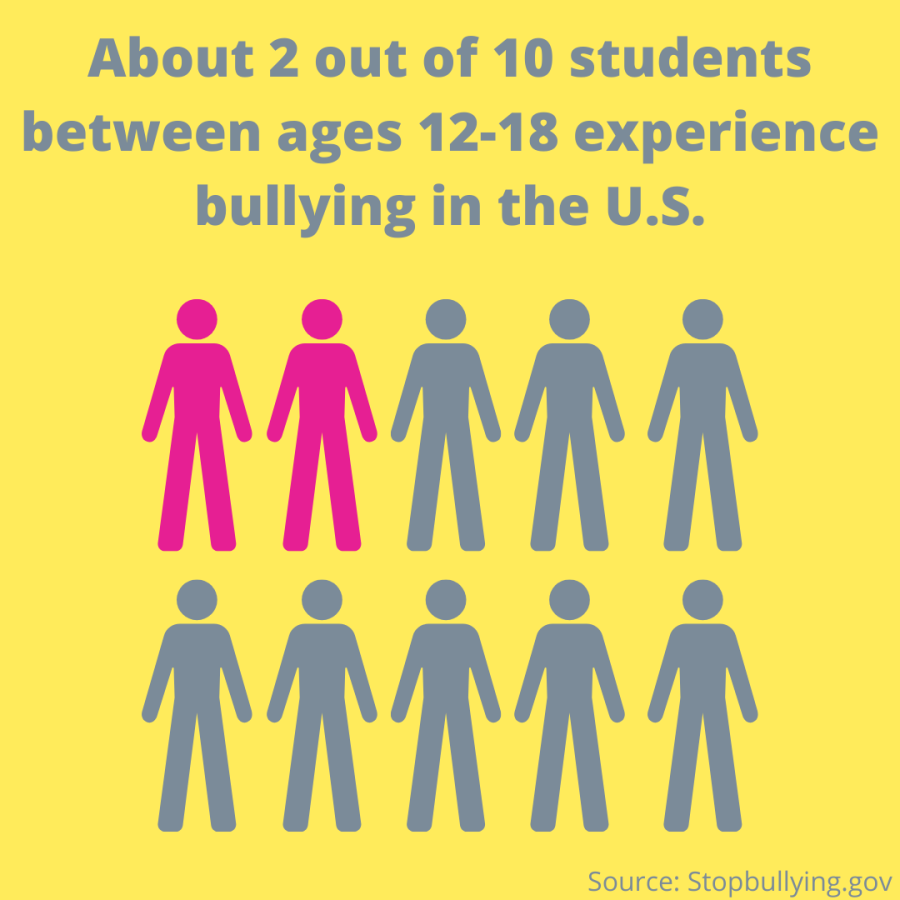Bullying is a prominent issue in grade schools across the United States that can have lasting effects throughout someone’s life.
According to stopbullying.gov, over 20% of kids have reported being bullied or picked on during their grade school years all the way through the end of high school. Students who are bullied can experience negative impacts later on in their lives, especially in college. Some effects of bullying could be struggling with mental health, getting involved with crimes or engaging in substance abuse.
No matter the circumstances, there is no excuse for bullying.
According to American Addictions Center, long-term impacts of bullying can cause mental health issues such as anxiety and depression. It can also decrease self-esteem. These factors can impact a college student, making them feel isolated. They may struggle with living on their own or with a roommate for the first time, making new friends and meaningful relationships and asking for help in their classes.
Furthermore, prolonged anxiety and depression can lead to substance abuse. According to the National Institute on Alcohol Abuse and Alcoholism, about 53% of college students admit to underage or excessive drinking. In addition, according to Turnbridge, a mental health and substance abuse addiction treatment program, 43% of students reported doing “illicit” drugs.
While most of these high numbers come from peer pressure, this can also be a way to cope with their emotions and unresolved trauma by altering their emotional pain. However, they are not familiar with the repercussions.
Bullying may also lead to unresolved anger issues which can cause harm to others. Many school shootings have occurred when the perpetrator was a victim of bullying. Adam Lanza, who was the shooter in the 2012 Sandy Hook school shooting that resulted in 28 deaths and 2 injuries, went to school there as a child and was reported to be bullied. Similarly, Nikolas Cruz, the shooter in the 2018 Marjorie Stoneman Douglas High School shooting, who killed 17 and injured 14 people, was also reported to be bullied while he was a student there.
While bullying is not an excuse for these tragedies or these people’s actions, it may be an explanation, as bullying may have exacerbated personal and mental issues they were already dealing with.
While students’ actions cannot be monitored 24/7, bullying could be prevented by schools instilling preventative measures. Teachers can constantly remind students of how to treat others with respect, Also, they can foster better communication skills in all the students involved so that they can better express their feelings rather than resort to unhealthier ways, such as bullying. They can also take proper discipline methods for students that instigate bullying.
For example, Jane Addams Middle School in Lawndale, California, enforces an anti-bullying program for students. The program encourages and teaches them to stand up for themselves and each other. Additionally, the school has a counseling and group mediation program that helps both students who are victims of bullying and the students who bully.
Other grade schools should implement similar programs. Some examples can be therapy and group mediation. Both are methods for students to express their feelings with a certified therapist and learn ways to manage their emotions. With group therapy, students can lean on each other to talk about difficult experiences and share techniques. It can also be a way for the person doing the bullying and the victims to talk with a supervising professional.
Even universities can offer programs to deal with the after effects of bullying, such as therapy and group meditation. Marquette offers both of these resources through Holthusen Hall.
The emotional violence and trauma that victims of bullying experience can lead to mental health issues, engaging in drugs and alcohol and expressing their anger in an inappropriate way. To prevent bullying or help victims cope, teachers and educators should encourage better discipline to prevent bullying.
They should also encourage therapy for everyone involved to better express their feelings and emotions and learn how they can cope in a much healthier way. Schools could even adopt practices and suggestions from anti-bullying programs such as STOMPoutbullying.org and Stopbullying.gov that aim to put an end to bullying.
If we work to address bullying at a young age, long-term effects that drastically and negatively alter the course of someone’s life could be avoided. This could help to prevent mass tragedies, drug addictions and mental health issues, allowing people to live freely from these struggles.
This story was written by Krisha Patel. She can be reached at [email protected]







